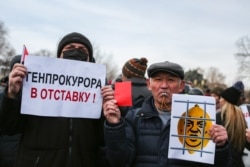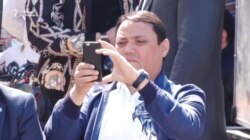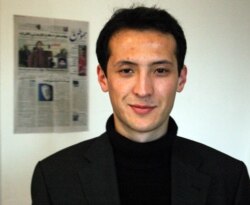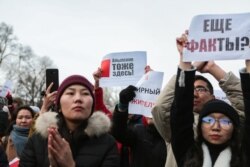On Dec. 12, the U.S. House Foreign Affairs Committee tweeted: “The Kyrgyz Government is suppressing journalism rather rooting out credible allegations of corruption from @Kloopnews & @RFERL Kyrgyz Service, @Azattyk_Radiosu. Intimidating & silencing a free press is an assault on basic freedoms. The government should change course immediately.”
In response, Kyrgyzstan’s Foreign Ministry called the committee’s tweet “an attempt to interfere in the internal affairs of a sovereign state, as well as pressure on the judiciary of the Kyrgyz Republic.”
The ministry also stated: “We especially note that in Kyrgyzstan there are no restrictions whatsoever on the activities of the media.”
That claim is false.
The Paris-based Reporters Without Borders (RSF) ranked Kyrgyzstan 83rd out of the 180 nations on its 2019 World Press Freedom index. RSF ranked four other Central Asian states even lower: Turkmenistan was ranked the worst in the world – 180th – behind Tajikistan (161st), Uzbekistan (160th) and Kazakhstan (158th).
Still, according to RSF, while the 2017 presidential elections in Kyrgyzstan ended “authoritarian excesses” there, the media environment in the country remains vulnerable due to the lack of judicial independence. While the country’s current leader, Sooronbay Jeenbekov, is seen as more progressive than former president Almazbek Atabayev, who is under investigation for alleged corruption, RSF says Kyrgyzstan needs to reform its defamation and anti-extremism laws, which make it possible to target journalists with “ill-advised” criminal prosecutions.
In its most recent annual Freedom in the World report, Freedom House rated Kyrgyzstan as “partly free,” and noted that Kyrgyz journalists “continued to risk arrest, prosecution, and civil suits for critical reporting in 2018.”
According to media experts in Kyrgyzstan, the Kyrgyz state continues to use the legal system against the independent press. Lawsuits and arrests targeting investigative journalists are used to suppress media pluralism and promote self-censorship, with expensive defamation suits crippling independent outlets.
Two recent cases involve the independent agency Koop.kg and the Kyrgyz language service of the U.S. government-funded broadcaster RFE/RL.
Reporters for the two outlets face hefty fines and possible prison terms as a result of defamation suits filed against them for investigative reports about corruption schemes involving former and current Kyrgyz government officials.
The investigations, conducted jointly by Kloop.kz, RFE/RL’s Kyrgyz service and the Budapest-based Organized Crime and Corruption Reporting Project (OCCRP) in April 2019, uncovered a corruption scheme involving current and former government officials who embezzled 940 million Kyrgyz soms ($13.4 million). The investigations were based on information provided by a whistleblower, who claimed that hundreds of millions of dollars had been moved out of Kyrgyzstan through a business network led by a secretive Chinese-born Uyghur who was a citizen of Kazakhstan. Authorities later said that the total sum stolen by the network was nearly $1 billion.
Last week, a court in Bishkek froze the bank accounts of RFE/RL correspondent Ali Toktakunov, RFE/RL's Kyrgyz Service and OCCRP partner Kloop.kz as part of a libel suit filed on behalf of the family of Raimbek Matraimov, a former deputy head of the country’s customs service. The independent website 24.kg, which published a summary of the corruption investigations, also had its bank account frozen.
Following a public outcry, the Matraimov family withdrew its demand and the court unfroze the accounts.
The Matraimov family claims that the reports damaged their "honor, dignity, and business reputations." It is demanding that the defendants pay the equivalent of $860,000.
On Dec. 18, people took to the streets of Bishkek, Kyrgyzstan’s capital, to protest corruption and the prosecution and arrest of journalists.
A mass protest against corruption had taken place in Bishkek just two weeks earlier -- on Nov. 25.
According to rights groups, justice has not yet been done for two Kyrgyz journalists victimized in previous decades.
On Oct. 24, 2007, Alisher Saipov, editor of the independent weekly Siyosat (Politics) and contributor to RFE/RL and the Voice of America, was shot three times by an unknown gunman, using a silencer. He died at the scene.
The man convicted of Saipov’s assassination and sentenced to 20 years in prison was released after new evidence proved he was with relatives at the time of the killing. The Committee to Protect Journalists (CPJ) suspects state involvement in the assassination and has labeled Saipov’s murder as a case of “complete impunity.”
In September 2010, Azimjon Askarov, the editor of an independent newspaper in Kyrgyzstan, was convicted and sentenced to life in prison on charges that international press freedom and human rights watchdogs say were trumped up.
The United Nations Human Rights Committee ruled in March 2016 that Askarov was arbitrarily detained, held in inhumane conditions, tortured and otherwise ill-treated without redress, and was not given a fair trial.
“As long as there is a journalist in jail in Kyrgyzstan, they cannot claim to have free press and safety for journalists,” Gulnoza Said, the Europe and Central Asia program coordinator at CPJ, told Polygraph.info. “Despite the calls of the international community, including the U.N., Kyrgyzstan has refused to release the 68-year-old journalist, who is suffering from multiple health conditions.”



